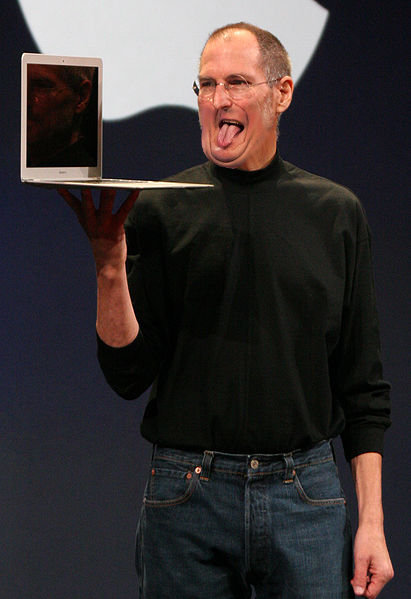
--Steve Jobs

Steve Jobs photo by Matthew Yohe, mouth belongs to Steve Ballmer (modified by Techrights)
As an Android developer in a field so utterly & heavily infested with software patents (computer vision) the subject affects me personally. Apple and Microsoft have chosen to collaborate in their attack on the fastest-growing Linux-based operating system and to sit back simply ignoring it would be irrational. Developers all around the world are suffering from software patents as it not only leads to spurious litigation; it also affects behaviour (e.g. reluctance to develop due to fear, desperation, cynicism). For those who choose to engage in activism and not just develop the resentment towards Apple and Microsoft is not pathological, it's logical. When someone is attacking you the natural instinct is to fight back. It is innate, and it's a matter of one's survival.
HTC was exhibiting more than a bit of buyer's remorse after its acquisition of S3 Graphics went off the rails: it had used the $300 million deal to scoop up a company with a victory over Apple in a patent dispute at the ITC, only to see that decision reversed and its dreams crumble. S3 will be glad to know that HTC wants the shotgun wedding to last.
Apple CEO today announced that this year will be the last WWDC. The company announced that they are replacing it with WWLC, Apple Worldwide Lawyer Conference.
WWLC will be primarily used by Apple to showcase its new patents and court cases to lawyers, as well as offering hands-on cross-examination and cease and desist sessions.
Apple has released, iSue, a suite of new tools and technologies for developers which they can use to get in direct touch with lawyers.
Nokia and Microsoft Alliance Raise Significant Competition Concerns
In March 2011, Nokia and Microsoft formed what they called a "strategic partnership" after the Windows 7 developer paid $1 billion to the world's largest handset maker. Aspects of the deal quickly revealed Nokia, once a strong open source advocate, was turning its back on its friends and unleashing its patents against open source technologies such as Android. The aging tech giants established a new business model for the handset maker -- one of asserting Nokia's vast patent portfolio to demand higher licensing fees and garner a higher percentage of sales royalties.
Microsoft and Nokia understand the threat of a countersuit generally tempers the incentive for large technology companies to engage in aggressive and oppressive patent enforcement. Any stand-off is often resolved through pro-competitive cross-licensing arrangements between the technology companies. This is the optimal outcome for consumers, as it ensures more developers have access to the patents and technologies they need to continue developing new products. However, Microsoft and Nokia are not striving for the optimal outcome; they want to cripple their competitors, even at the cost of harming consumers. So, how to leverage a patent trove without the threat of countersuit? Get patent trolls to do your dirty work.
Just six months after the alliance formed, Microsoft and Nokia jointly armed a known patent troll called MOSAID with 2,000 of Nokia patents, 1,200 of which are standard essential patents or SEPs. It was soon discovered that under the terms of the agreement the aging tech giants would share the royalties from these patents with MOSAID. The "strategic partnership" didn't stop there. Nokia then turned around and armed another troll, Sisvel, with 450 patents. Recently, Nokia and its trolls started launching attacks against Android partners HTC and ViewSonic. Lawsuits by these trolls against Android original equipment manufacturers (OEMs) are expected soon.
This is nothing short of a frontal assault on the use of open source software which is the foundation for the explosive growth of smartphones. Open source means there is a technology highway with no toll booths. The Android code was released as open source, meaning the code is free for anyone to use or improve. Google provides Android for free to reduce costs so more people can afford a smart phone and to encourage innovation. With more than 550 Android devices on the market, there's no question Android has accomplished these goals.
It is not entirely surprising that Microsoft and Nokia are desperate to disarm their competitors, and attempt to kill off open source. Nokia and Microsoft have struggled to adapt to a smart phone ecosystem underscored by rapid growth and collaborative innovation. What is surprising, though, is their decision to turn to patent trolls as the weapon of choice. Notwithstanding the cutthroat competition in the industry, none of the other prominent companies have ever resorted to such underhanded tactics as trolling. All of these companies have dealt with patent trolls before and know they are nothing but a tax on the industry, extracting money while producing nothing, and driving up costs for everyone else.
A couple of months ago, Twitter made a pledge that is heartening to anyone sick of patent lawsuits. The company will not use any patents derived from employee inventions to launch offensive lawsuits without the inventor’s permission.
[...]
Developed by Berkeley Law professors Jason Schultz and Jennifer Urban, the Defensive Patent License (DPL) project has been in development well before Twitter’s pledge. The project just launched its website and the legal document members will be asked to commit to.
Any company that commits to the terms of the Defensive Patent License would have to pledge all of the patents it owns to this league of do-gooders. Any other member of the league would gain a free license to any other member’s patents, and no one in the league would be allowed to launch offensive patent lawsuits against other members of the league. Doing so would be grounds for the member to have its license revoked.